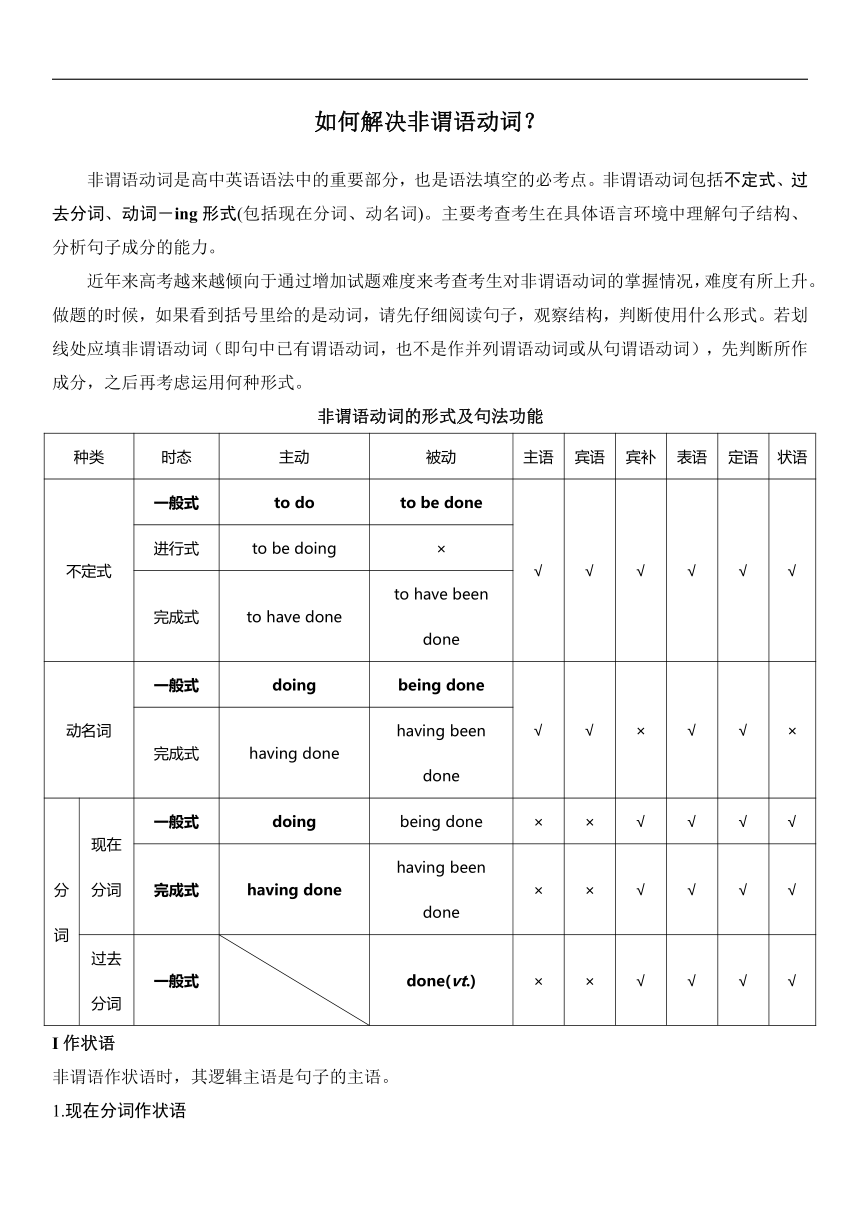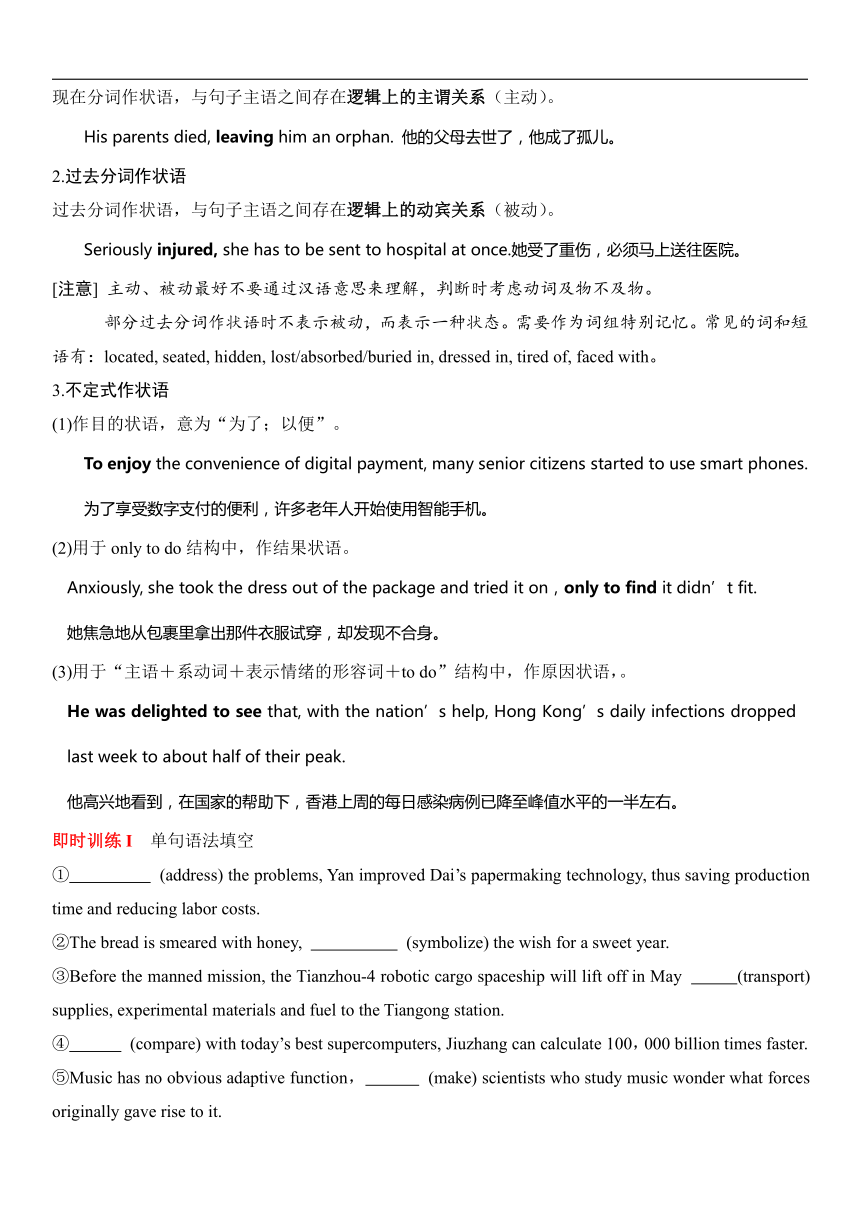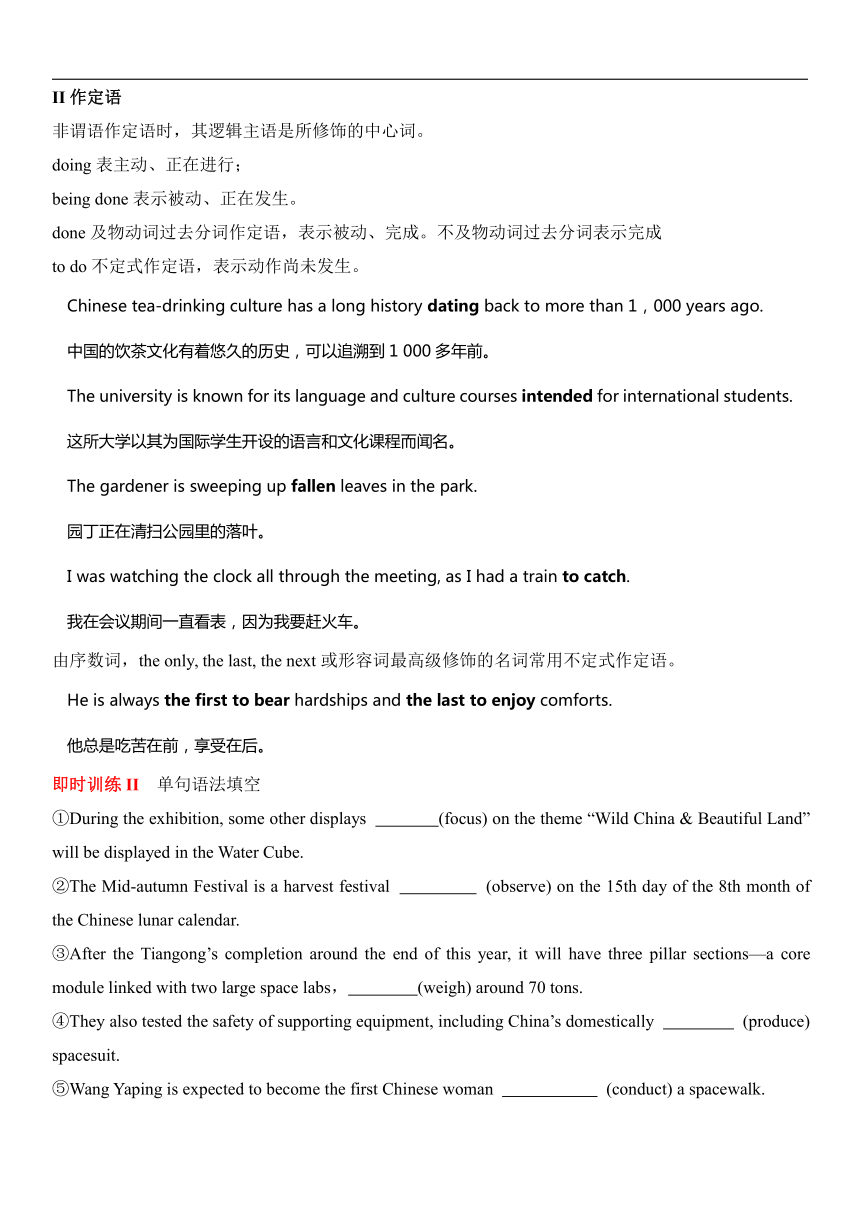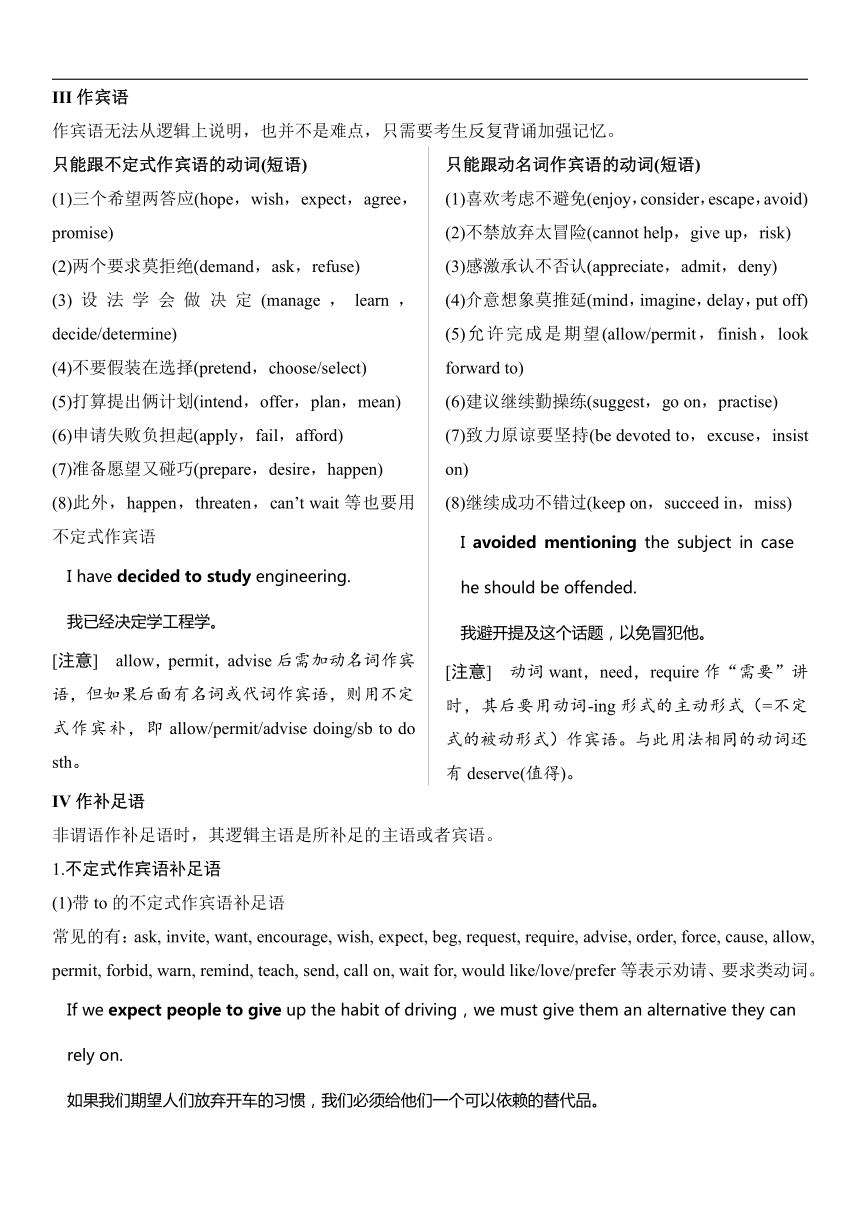2024届高考英语二轮复习:语法填空之非谓语动词题讲义学案(含答案)
文档属性
| 名称 | 2024届高考英语二轮复习:语法填空之非谓语动词题讲义学案(含答案) |  | |
| 格式 | DOCX | ||
| 文件大小 | 29.0KB | ||
| 资源类型 | 教案 | ||
| 版本资源 | 通用版 | ||
| 科目 | 英语 | ||
| 更新时间 | 2024-02-11 20:09:15 | ||
图片预览




文档简介
如何解决非谓语动词?
非谓语动词是高中英语语法中的重要部分,也是语法填空的必考点。非谓语动词包括不定式、过去分词、动词-ing形式(包括现在分词、动名词)。主要考查考生在具体语言环境中理解句子结构、分析句子成分的能力。
近年来高考越来越倾向于通过增加试题难度来考查考生对非谓语动词的掌握情况,难度有所上升。做题的时候,如果看到括号里给的是动词,请先仔细阅读句子,观察结构,判断使用什么形式。若划线处应填非谓语动词(即句中已有谓语动词,也不是作并列谓语动词或从句谓语动词),先判断所作成分,之后再考虑运用何种形式。
非谓语动词的形式及句法功能
种类 时态 主动 被动 主语 宾语 宾补 表语 定语 状语
不定式 一般式 to do to be done √ √ √ √ √ √
进行式 to be doing ×
完成式 to have done to have been done
动名词 一般式 doing being done √ √ × √ √ ×
完成式 having done having been done
分 词 现在分词 一般式 doing being done × × √ √ √ √
完成式 having done having been done × × √ √ √ √
过去分词 一般式 done(vt.) × × √ √ √ √
I作状语
非谓语作状语时,其逻辑主语是句子的主语。
1.现在分词作状语
现在分词作状语,与句子主语之间存在逻辑上的主谓关系(主动)。
His parents died, leaving him an orphan. 他的父母去世了,他成了孤儿。
2.过去分词作状语
过去分词作状语,与句子主语之间存在逻辑上的动宾关系(被动)。
Seriously injured, she has to be sent to hospital at once.她受了重伤,必须马上送往医院。
[注意] 主动、被动最好不要通过汉语意思来理解,判断时考虑动词及物不及物。
部分过去分词作状语时不表示被动,而表示一种状态。需要作为词组特别记忆。常见的词和短语有:located, seated, hidden, lost/absorbed/buried in, dressed in, tired of, faced with。
3.不定式作状语
(1)作目的状语,意为“为了;以便”。
To enjoy the convenience of digital payment, many senior citizens started to use smart phones.
为了享受数字支付的便利,许多老年人开始使用智能手机。
(2)用于only to do结构中,作结果状语。
Anxiously, she took the dress out of the package and tried it on,only to find it didn’t fit.
她焦急地从包裹里拿出那件衣服试穿,却发现不合身。
(3)用于“主语+系动词+表示情绪的形容词+to do”结构中,作原因状语,。
He was delighted to see that, with the nation’s help, Hong Kong’s daily infections dropped last week to about half of their peak.
他高兴地看到,在国家的帮助下,香港上周的每日感染病例已降至峰值水平的一半左右。
即时训练I 单句语法填空
① (address) the problems, Yan improved Dai’s papermaking technology, thus saving production time and reducing labor costs.
②The bread is smeared with honey, (symbolize) the wish for a sweet year.
③Before the manned mission, the Tianzhou-4 robotic cargo spaceship will lift off in May (transport) supplies, experimental materials and fuel to the Tiangong station.
④ (compare) with today’s best supercomputers, Jiuzhang can calculate 100,000 billion times faster.
⑤Music has no obvious adaptive function, (make) scientists who study music wonder what forces originally gave rise to it.
II作定语
非谓语作定语时,其逻辑主语是所修饰的中心词。
doing表主动、正在进行;
being done表示被动、正在发生。
done及物动词过去分词作定语,表示被动、完成。不及物动词过去分词表示完成
to do不定式作定语,表示动作尚未发生。
Chinese tea-drinking culture has a long history dating back to more than 1,000 years ago.
中国的饮茶文化有着悠久的历史,可以追溯到1 000多年前。
The university is known for its language and culture courses intended for international students.
这所大学以其为国际学生开设的语言和文化课程而闻名。
The gardener is sweeping up fallen leaves in the park.
园丁正在清扫公园里的落叶。
I was watching the clock all through the meeting, as I had a train to catch.
我在会议期间一直看表,因为我要赶火车。
由序数词,the only, the last, the next或形容词最高级修饰的名词常用不定式作定语。
He is always the first to bear hardships and the last to enjoy comforts.
他总是吃苦在前,享受在后。
即时训练II 单句语法填空
①During the exhibition, some other displays (focus) on the theme “Wild China & Beautiful Land” will be displayed in the Water Cube.
②The Mid-autumn Festival is a harvest festival (observe) on the 15th day of the 8th month of the Chinese lunar calendar.
③After the Tiangong’s completion around the end of this year, it will have three pillar sections—a core module linked with two large space labs, (weigh) around 70 tons.
④They also tested the safety of supporting equipment, including China’s domestically (produce) spacesuit.
⑤Wang Yaping is expected to become the first Chinese woman (conduct) a spacewalk.
III作宾语
作宾语无法从逻辑上说明,也并不是难点,只需要考生反复背诵加强记忆。
只能跟不定式作宾语的动词(短语)
(1)三个希望两答应(hope,wish,expect,agree,promise)
(2)两个要求莫拒绝(demand,ask,refuse)
(3)设法学会做决定(manage,learn,decide/determine)
(4)不要假装在选择(pretend,choose/select)
(5)打算提出俩计划(intend,offer,plan,mean)
(6)申请失败负担起(apply,fail,afford)
(7)准备愿望又碰巧(prepare,desire,happen)
(8)此外,happen,threaten,can’t wait等也要用不定式作宾语
I have decided to study engineering.
我已经决定学工程学。
[注意] allow,permit,advise后需加动名词作宾语,但如果后面有名词或代词作宾语,则用不定式作宾补,即allow/permit/advise doing/sb to do sth。
只能跟动名词作宾语的动词(短语)
(1)喜欢考虑不避免(enjoy,consider,escape,avoid)
(2)不禁放弃太冒险(cannot help,give up,risk)
(3)感激承认不否认(appreciate,admit,deny)
(4)介意想象莫推延(mind,imagine,delay,put off)
(5)允许完成是期望(allow/permit,finish,look forward to)
(6)建议继续勤操练(suggest,go on,practise)
(7)致力原谅要坚持(be devoted to,excuse,insist on)
(8)继续成功不错过(keep on,succeed in,miss)
I avoided mentioning the subject in case he should be offended.
我避开提及这个话题,以免冒犯他。
[注意] 动词want,need,require作“需要”讲时,其后要用动词-ing形式的主动形式(=不定式的被动形式)作宾语。与此用法相同的动词还有deserve(值得)。
IV作补足语
非谓语作补足语时,其逻辑主语是所补足的主语或者宾语。
1.不定式作宾语补足语
(1)带to的不定式作宾语补足语
常见的有:ask, invite, want, encourage, wish, expect, beg, request, require, advise, order, force, cause, allow, permit, forbid, warn, remind, teach, send, call on, wait for, would like/love/prefer等表示劝请、要求类动词。
If we expect people to give up the habit of driving,we must give them an alternative they can rely on.
如果我们期望人们放弃开车的习惯,我们必须给他们一个可以依赖的替代品。
(2)不带to的不定式作宾语补足语
常用动词(主动语态中)有:使役动词(make,let,have);感官动词(see,watch,observe,hear,notice)。
[点拨]
(1)有些动词,如think,consider,believe,suppose,feel,find,understand等后常用to be作补足语。
Chinese people are considered to be the most hard-working people in the world.
中国人被认为是世界上最勤劳的人民。
(2)在sb be said/believed/known/reported/considered/thought+to do/to have done结构中,用不定式作主语补足语。
The president was reported to have visited China.据报道,那位总统已经访问了中国。
2.现在分词作宾语补足语
表示主动、进行。常用现在分词作宾语补足语的有:feel, find, hear, notice, observe, see, watch, get, have, keep, leave, send, set, listen to, look at等。
I heard the clock striking eight when I woke up this morning. 今天早上醒来时,我听见钟敲了八下。
After I arrived in America, I found myself living in a completely foreign culture.
当我到达美国后,我发现自己生活在一个完全陌生的文化中。
3.过去分词作宾语补足语
表示被动、完成。常用过去分词作宾语补足语的有:have, make, get, find, see, notice, watch, hear, feel, want, like等。
I found myself carried out to sea by a strong wind.我发现我被一阵强风刮到海上去了。
4.用于with复合结构
with+宾语+doing(表示主动且进行)/done(表示被动且完成)/to do(表示未做)。
He sat there,with his eyes looking at the sky.他坐在那里,眼睛看着天空。
With his mind concentrated on his work, he didn’t notice my appearance.他专心于工作,没有注意到我 的外表。
With much work to do this afternoon, Jack left hurriedly. 由于今天下午还有很多工作要做,杰克匆匆忙忙地离开了。
5.常用不定式作主语补足语的句型
Sb/Sth be said/believed/known/supposed/reported/considered/found/thought+to do/to have done/to be done/to have been done+其他。
He is said to have gone abroad.=It is said that he has gone abroad.据说他出国了。
Heat is considered to be a form of energy.热能被认为是一种能量形式。
You’re supposed to pay the bill by Friday.你应该在星期五前付账。
即时训练III 单句语法填空
①Then, I reached for my daughter’s hand and asked her (take) a walk in the field.
②Somehow I forced my finger (press) the button.
③During the Qin dynasty,to keep the enemy out of empire,Emperor Qin had all walls (join) up.
④He was also seen (wave) the 11-year-old off at the school gate as she walked into the building.
⑤Instead, one activist, dressed in a full-body monkey suit, had arrived with a sign (praise) the filmmakers.
V作主语和表语
1.不定式作主语和表语
(1)不定式作主语时常置于句末,用it作形式主语放在句首。
It’s rude to turn your back to your teacher and refuse to answer. 背对着老师,拒绝回答问题是不礼貌的。
(2)不定式作表语,主语往往是dream,goal,aim,purpose,plan 等表示意向、打算、计划的词。
My dream is to become a doctor after my graduation from university.我的梦想是大学毕业后当一名医生。
2.动名词作主语和表语
(1)动名词(短语)作主语时,可以直接放在句首,谓语动词常常用单数。
Taking part in the English speech competition is a helpful way to learn English.
参加英语演讲比赛是学习英语的一种很有帮助的方法。
(2)有时用it作形式主语,常用于It be + a waste (of...)/no use/no good + doing sth结构中。
It’s no use arguing with him about the question, for he won’t change his mind.
和他争论这个问题是没有用的,因为他是不会改变主意的。
(3)动名词作表语时相当于名词,用于解释主语的内容,表语和主语常常可以互换位置。
My job is cleaning the house three times a week.(Cleaning the house three times a week is my job.)
我的工作是每星期打扫三次房子。
3.分词作表语
(1)现在分词作表语,意为“令人感到……的”;
(2)过去分词作表语,意为“感到……的”;
即时训练IV 单句语法填空
①Robert Owens felt (defeat) and helpless on Sunday as he waited in Louisiana’s capital city.
②The art of Chinese calligraphy seems (fade) away gradually.
③The lake appears (cover) as much as 80 square miles.
④ (map) the distribution of cave species could act as additional evidence for researchers investigating past climate conditions.
⑤It took years of work (reduce) the industrial pollution and clean the water.
答案:即时训练I 1.To address 2.symbolizing 3.to transport 4.Compared 5.making
即时训练II 1.focusing 2.observed 3.weighing 4.produced 5.to conduct
即时训练III 1. to take 2. to press 3. joined 4. waving 5. praising
即时训练IV 1.defeated 2.to be fading 3.to have covered 4.Mapping 5.to reduce
非谓语动词是高中英语语法中的重要部分,也是语法填空的必考点。非谓语动词包括不定式、过去分词、动词-ing形式(包括现在分词、动名词)。主要考查考生在具体语言环境中理解句子结构、分析句子成分的能力。
近年来高考越来越倾向于通过增加试题难度来考查考生对非谓语动词的掌握情况,难度有所上升。做题的时候,如果看到括号里给的是动词,请先仔细阅读句子,观察结构,判断使用什么形式。若划线处应填非谓语动词(即句中已有谓语动词,也不是作并列谓语动词或从句谓语动词),先判断所作成分,之后再考虑运用何种形式。
非谓语动词的形式及句法功能
种类 时态 主动 被动 主语 宾语 宾补 表语 定语 状语
不定式 一般式 to do to be done √ √ √ √ √ √
进行式 to be doing ×
完成式 to have done to have been done
动名词 一般式 doing being done √ √ × √ √ ×
完成式 having done having been done
分 词 现在分词 一般式 doing being done × × √ √ √ √
完成式 having done having been done × × √ √ √ √
过去分词 一般式 done(vt.) × × √ √ √ √
I作状语
非谓语作状语时,其逻辑主语是句子的主语。
1.现在分词作状语
现在分词作状语,与句子主语之间存在逻辑上的主谓关系(主动)。
His parents died, leaving him an orphan. 他的父母去世了,他成了孤儿。
2.过去分词作状语
过去分词作状语,与句子主语之间存在逻辑上的动宾关系(被动)。
Seriously injured, she has to be sent to hospital at once.她受了重伤,必须马上送往医院。
[注意] 主动、被动最好不要通过汉语意思来理解,判断时考虑动词及物不及物。
部分过去分词作状语时不表示被动,而表示一种状态。需要作为词组特别记忆。常见的词和短语有:located, seated, hidden, lost/absorbed/buried in, dressed in, tired of, faced with。
3.不定式作状语
(1)作目的状语,意为“为了;以便”。
To enjoy the convenience of digital payment, many senior citizens started to use smart phones.
为了享受数字支付的便利,许多老年人开始使用智能手机。
(2)用于only to do结构中,作结果状语。
Anxiously, she took the dress out of the package and tried it on,only to find it didn’t fit.
她焦急地从包裹里拿出那件衣服试穿,却发现不合身。
(3)用于“主语+系动词+表示情绪的形容词+to do”结构中,作原因状语,。
He was delighted to see that, with the nation’s help, Hong Kong’s daily infections dropped last week to about half of their peak.
他高兴地看到,在国家的帮助下,香港上周的每日感染病例已降至峰值水平的一半左右。
即时训练I 单句语法填空
① (address) the problems, Yan improved Dai’s papermaking technology, thus saving production time and reducing labor costs.
②The bread is smeared with honey, (symbolize) the wish for a sweet year.
③Before the manned mission, the Tianzhou-4 robotic cargo spaceship will lift off in May (transport) supplies, experimental materials and fuel to the Tiangong station.
④ (compare) with today’s best supercomputers, Jiuzhang can calculate 100,000 billion times faster.
⑤Music has no obvious adaptive function, (make) scientists who study music wonder what forces originally gave rise to it.
II作定语
非谓语作定语时,其逻辑主语是所修饰的中心词。
doing表主动、正在进行;
being done表示被动、正在发生。
done及物动词过去分词作定语,表示被动、完成。不及物动词过去分词表示完成
to do不定式作定语,表示动作尚未发生。
Chinese tea-drinking culture has a long history dating back to more than 1,000 years ago.
中国的饮茶文化有着悠久的历史,可以追溯到1 000多年前。
The university is known for its language and culture courses intended for international students.
这所大学以其为国际学生开设的语言和文化课程而闻名。
The gardener is sweeping up fallen leaves in the park.
园丁正在清扫公园里的落叶。
I was watching the clock all through the meeting, as I had a train to catch.
我在会议期间一直看表,因为我要赶火车。
由序数词,the only, the last, the next或形容词最高级修饰的名词常用不定式作定语。
He is always the first to bear hardships and the last to enjoy comforts.
他总是吃苦在前,享受在后。
即时训练II 单句语法填空
①During the exhibition, some other displays (focus) on the theme “Wild China & Beautiful Land” will be displayed in the Water Cube.
②The Mid-autumn Festival is a harvest festival (observe) on the 15th day of the 8th month of the Chinese lunar calendar.
③After the Tiangong’s completion around the end of this year, it will have three pillar sections—a core module linked with two large space labs, (weigh) around 70 tons.
④They also tested the safety of supporting equipment, including China’s domestically (produce) spacesuit.
⑤Wang Yaping is expected to become the first Chinese woman (conduct) a spacewalk.
III作宾语
作宾语无法从逻辑上说明,也并不是难点,只需要考生反复背诵加强记忆。
只能跟不定式作宾语的动词(短语)
(1)三个希望两答应(hope,wish,expect,agree,promise)
(2)两个要求莫拒绝(demand,ask,refuse)
(3)设法学会做决定(manage,learn,decide/determine)
(4)不要假装在选择(pretend,choose/select)
(5)打算提出俩计划(intend,offer,plan,mean)
(6)申请失败负担起(apply,fail,afford)
(7)准备愿望又碰巧(prepare,desire,happen)
(8)此外,happen,threaten,can’t wait等也要用不定式作宾语
I have decided to study engineering.
我已经决定学工程学。
[注意] allow,permit,advise后需加动名词作宾语,但如果后面有名词或代词作宾语,则用不定式作宾补,即allow/permit/advise doing/sb to do sth。
只能跟动名词作宾语的动词(短语)
(1)喜欢考虑不避免(enjoy,consider,escape,avoid)
(2)不禁放弃太冒险(cannot help,give up,risk)
(3)感激承认不否认(appreciate,admit,deny)
(4)介意想象莫推延(mind,imagine,delay,put off)
(5)允许完成是期望(allow/permit,finish,look forward to)
(6)建议继续勤操练(suggest,go on,practise)
(7)致力原谅要坚持(be devoted to,excuse,insist on)
(8)继续成功不错过(keep on,succeed in,miss)
I avoided mentioning the subject in case he should be offended.
我避开提及这个话题,以免冒犯他。
[注意] 动词want,need,require作“需要”讲时,其后要用动词-ing形式的主动形式(=不定式的被动形式)作宾语。与此用法相同的动词还有deserve(值得)。
IV作补足语
非谓语作补足语时,其逻辑主语是所补足的主语或者宾语。
1.不定式作宾语补足语
(1)带to的不定式作宾语补足语
常见的有:ask, invite, want, encourage, wish, expect, beg, request, require, advise, order, force, cause, allow, permit, forbid, warn, remind, teach, send, call on, wait for, would like/love/prefer等表示劝请、要求类动词。
If we expect people to give up the habit of driving,we must give them an alternative they can rely on.
如果我们期望人们放弃开车的习惯,我们必须给他们一个可以依赖的替代品。
(2)不带to的不定式作宾语补足语
常用动词(主动语态中)有:使役动词(make,let,have);感官动词(see,watch,observe,hear,notice)。
[点拨]
(1)有些动词,如think,consider,believe,suppose,feel,find,understand等后常用to be作补足语。
Chinese people are considered to be the most hard-working people in the world.
中国人被认为是世界上最勤劳的人民。
(2)在sb be said/believed/known/reported/considered/thought+to do/to have done结构中,用不定式作主语补足语。
The president was reported to have visited China.据报道,那位总统已经访问了中国。
2.现在分词作宾语补足语
表示主动、进行。常用现在分词作宾语补足语的有:feel, find, hear, notice, observe, see, watch, get, have, keep, leave, send, set, listen to, look at等。
I heard the clock striking eight when I woke up this morning. 今天早上醒来时,我听见钟敲了八下。
After I arrived in America, I found myself living in a completely foreign culture.
当我到达美国后,我发现自己生活在一个完全陌生的文化中。
3.过去分词作宾语补足语
表示被动、完成。常用过去分词作宾语补足语的有:have, make, get, find, see, notice, watch, hear, feel, want, like等。
I found myself carried out to sea by a strong wind.我发现我被一阵强风刮到海上去了。
4.用于with复合结构
with+宾语+doing(表示主动且进行)/done(表示被动且完成)/to do(表示未做)。
He sat there,with his eyes looking at the sky.他坐在那里,眼睛看着天空。
With his mind concentrated on his work, he didn’t notice my appearance.他专心于工作,没有注意到我 的外表。
With much work to do this afternoon, Jack left hurriedly. 由于今天下午还有很多工作要做,杰克匆匆忙忙地离开了。
5.常用不定式作主语补足语的句型
Sb/Sth be said/believed/known/supposed/reported/considered/found/thought+to do/to have done/to be done/to have been done+其他。
He is said to have gone abroad.=It is said that he has gone abroad.据说他出国了。
Heat is considered to be a form of energy.热能被认为是一种能量形式。
You’re supposed to pay the bill by Friday.你应该在星期五前付账。
即时训练III 单句语法填空
①Then, I reached for my daughter’s hand and asked her (take) a walk in the field.
②Somehow I forced my finger (press) the button.
③During the Qin dynasty,to keep the enemy out of empire,Emperor Qin had all walls (join) up.
④He was also seen (wave) the 11-year-old off at the school gate as she walked into the building.
⑤Instead, one activist, dressed in a full-body monkey suit, had arrived with a sign (praise) the filmmakers.
V作主语和表语
1.不定式作主语和表语
(1)不定式作主语时常置于句末,用it作形式主语放在句首。
It’s rude to turn your back to your teacher and refuse to answer. 背对着老师,拒绝回答问题是不礼貌的。
(2)不定式作表语,主语往往是dream,goal,aim,purpose,plan 等表示意向、打算、计划的词。
My dream is to become a doctor after my graduation from university.我的梦想是大学毕业后当一名医生。
2.动名词作主语和表语
(1)动名词(短语)作主语时,可以直接放在句首,谓语动词常常用单数。
Taking part in the English speech competition is a helpful way to learn English.
参加英语演讲比赛是学习英语的一种很有帮助的方法。
(2)有时用it作形式主语,常用于It be + a waste (of...)/no use/no good + doing sth结构中。
It’s no use arguing with him about the question, for he won’t change his mind.
和他争论这个问题是没有用的,因为他是不会改变主意的。
(3)动名词作表语时相当于名词,用于解释主语的内容,表语和主语常常可以互换位置。
My job is cleaning the house three times a week.(Cleaning the house three times a week is my job.)
我的工作是每星期打扫三次房子。
3.分词作表语
(1)现在分词作表语,意为“令人感到……的”;
(2)过去分词作表语,意为“感到……的”;
即时训练IV 单句语法填空
①Robert Owens felt (defeat) and helpless on Sunday as he waited in Louisiana’s capital city.
②The art of Chinese calligraphy seems (fade) away gradually.
③The lake appears (cover) as much as 80 square miles.
④ (map) the distribution of cave species could act as additional evidence for researchers investigating past climate conditions.
⑤It took years of work (reduce) the industrial pollution and clean the water.
答案:即时训练I 1.To address 2.symbolizing 3.to transport 4.Compared 5.making
即时训练II 1.focusing 2.observed 3.weighing 4.produced 5.to conduct
即时训练III 1. to take 2. to press 3. joined 4. waving 5. praising
即时训练IV 1.defeated 2.to be fading 3.to have covered 4.Mapping 5.to reduce
